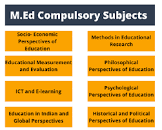The Importance of a Master of Arts in Education Degree
Education is a fundamental aspect of society that shapes the future by nurturing young minds and preparing them for success. Pursuing a Master of Arts in Education (MA Education) can be a significant step towards becoming a skilled and knowledgeable educator who can make a positive impact on students, schools, and communities.
One of the key benefits of obtaining an MA Education degree is the opportunity to deepen your understanding of educational theories, practices, and methodologies. Through specialized coursework, research projects, and practical experiences, graduate students can gain insights into the latest trends in education, innovative teaching strategies, and effective classroom management techniques.
Furthermore, an MA Education degree can enhance your career prospects by opening up new opportunities for advancement and specialization. Whether you aspire to become a curriculum developer, school administrator, educational consultant, or college professor, having an advanced degree in education can give you a competitive edge in the job market.
Another advantage of pursuing an MA Education is the chance to build a professional network of fellow educators, mentors, and industry experts. Graduate programs often provide opportunities for collaboration, mentorship, and networking that can help you expand your knowledge base, gain valuable insights from experienced professionals, and stay informed about current trends in education.
Additionally, earning an MA Education degree can lead to personal growth and fulfillment by allowing you to make a meaningful difference in the lives of students and contribute to the overall improvement of the education system. By honing your teaching skills, developing innovative educational programs, and advocating for educational equity and inclusivity, you can become a catalyst for positive change in your community.
In conclusion, pursuing a Master of Arts in Education degree is not only a valuable investment in your professional development but also a commitment to lifelong learning and continuous improvement as an educator. By earning an MA Education degree, you can acquire the knowledge, skills, and confidence needed to inspire future generations and shape the future of education.
Five Essential Tips for Mastering Your Education: Strategies for Organization, Time Management, and Well-Being
- Stay organized with your study materials and assignments.
- Manage your time effectively to balance coursework and other responsibilities.
- Seek help from professors or tutors when you encounter challenges in your studies.
- Engage actively in class discussions and activities to enhance your learning experience.
- Take breaks when needed to avoid burnout and maintain mental well-being.
Stay organized with your study materials and assignments.
Staying organized with your study materials and assignments is crucial when pursuing a Master of Arts in Education degree. By maintaining a systematic approach to managing your resources, notes, and deadlines, you can stay focused, efficient, and on track with your coursework. Organizing your study materials not only helps you locate information quickly but also ensures that you are well-prepared for exams, projects, and discussions. Additionally, staying on top of your assignments allows you to prioritize tasks effectively, meet deadlines consistently, and maintain a healthy work-life balance throughout your academic journey in MA Education.
Manage your time effectively to balance coursework and other responsibilities.
Managing your time effectively is crucial when pursuing a Master of Arts in Education degree to balance coursework and other responsibilities. By creating a structured schedule, setting priorities, and allocating dedicated time for studying, research, assignments, and personal commitments, graduate students can ensure they stay on track with their academic goals while maintaining a healthy work-life balance. Effective time management not only helps in meeting deadlines and completing coursework efficiently but also reduces stress levels and enhances overall productivity, allowing students to make the most of their educational experience and excel in their academic pursuits.
Seek help from professors or tutors when you encounter challenges in your studies.
When pursuing a Master of Arts in Education degree, it is essential to seek help from professors or tutors when encountering challenges in your studies. These experienced professionals can provide valuable guidance, clarification, and support to help you overcome obstacles and excel in your academic pursuits. By reaching out for assistance when needed, you can gain a deeper understanding of complex concepts, improve your performance in coursework, and enhance your overall learning experience. Embracing the opportunity to seek help demonstrates a proactive approach to your education and reflects your commitment to academic success and personal growth as a future educator.
Engage actively in class discussions and activities to enhance your learning experience.
Active engagement in class discussions and activities is a crucial tip for maximizing the benefits of pursuing a Master of Arts in Education degree. By actively participating in classroom interactions, sharing perspectives, and collaborating with peers, graduate students can deepen their understanding of educational concepts, gain new insights from diverse viewpoints, and develop critical thinking skills. Engaging in lively discussions and hands-on activities not only fosters a dynamic learning environment but also cultivates a sense of community among classmates, creating opportunities for meaningful connections and collaborative learning experiences that can enrich the overall educational journey.
Take breaks when needed to avoid burnout and maintain mental well-being.
It is essential for graduate students pursuing a Master of Arts in Education to prioritize their mental well-being by taking breaks when needed to prevent burnout. The rigorous demands of academic studies, research projects, and practical experiences can be overwhelming at times, making it crucial to step back, recharge, and practice self-care. By recognizing the signs of burnout and proactively taking breaks to rest, relax, and rejuvenate, MA Education students can maintain a healthy work-life balance and sustain their motivation and passion for learning and teaching. Prioritizing mental well-being not only enhances academic performance but also contributes to long-term success and fulfillment in the field of education.

